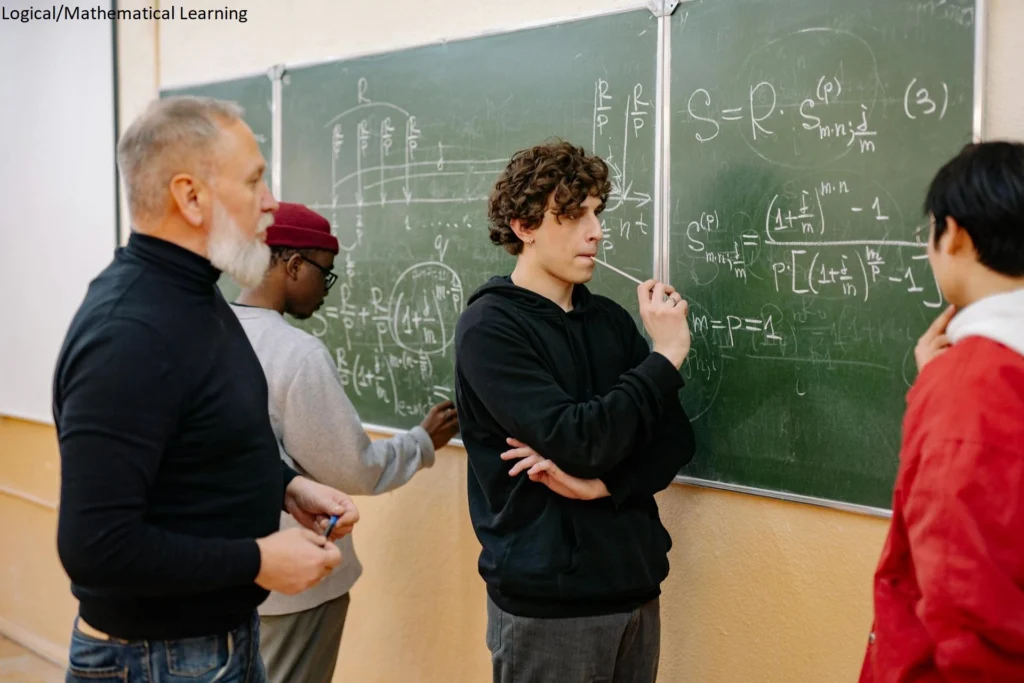Logical/Mathematical Learning a Problem-Solving and Critical Thinking Skill

Ever Wondered Why Some People Excel at Problem-Solving?
That’s the magic of logical/mathematical learning. This learning style involves the ability to analyze problems, identify patterns, and think critically. It’s like having a superpower for understanding complex concepts and making smart decisions. Logical/mathematical learning isn’t just for mathematicians and scientists. It plays a crucial role in everyday life, from planning a budget to solving puzzles. Mastering these skills can lead to academic success and open doors to exciting career opportunities.
Let’s dive into the world of logical/mathematical learning and discover its incredible benefits.

Understanding Logical/Mathematical Learning
Logical/mathematical learning is a powerful tool that sharpens the mind and hones critical skills. Logical/mathematical learners are known for their analytical thinking. They excel at dissecting problems and finding efficient solutions. Their problem-solving skills allow them to tackle challenges with precision and creativity. Pattern recognition is another key trait, enabling them to identify trends and make predictions.
These abilities are invaluable in everyday life. Think about planning a trip, managing finances, or fixing a broken gadget—logical/mathematical skills are at play. In the professional realm, these skills shine brightly.
Engineers use them to design complex systems.
Computer scientists rely on them to develop innovative software.
Financial analysts leverage these skills to predict market trends.
Understanding and nurturing logical/mathematical learning can transform ordinary thinkers into extraordinary problem solvers. By recognizing and applying these skills, one can unlock endless possibilities both personally and professionally.
Benefits of Logical/Mathematical Learning
Logical/mathematical learning offers a myriad of benefits that extend beyond the classroom.
Cognitive Development
This learning style significantly enhances cognitive development. It strengthens the brain’s ability to process information, improve memory, and boost critical thinking skills.
Academic Performance
Students who excel in logical/mathematical learning often perform better in academic subjects like math, science, and technology. They grasp complex concepts more easily and solve problems with confidence and creativity. The impact on academic performance is profound, opening doors to advanced studies and specialized fields.
Career Opportunities
Career opportunities for individuals with strong logical/mathematical skills are abundant and diverse. They can thrive in professions such as engineering, computer science, and finance. These fields value analytical thinkers who can develop innovative solutions and drive progress.
Embracing logical/mathematical learning not only enriches cognitive abilities but also paves the way for academic success and promising careers.
Strategies to Enhance Logical/Mathematical Learning
Enhancing logical/mathematical learning can be both enjoyable and highly effective with the right strategies.

Interactive Learning
Interactive learning is a fantastic way to develop these skills. Engaging activities and games like puzzles and brain teasers stimulate the mind and foster analytical thinking. Strategy games such as chess are excellent for honing problem-solving abilities and strategic planning.
Technology Integration
Integrating technology into learning can also provide significant benefits. There are numerous apps and online tools designed to boost logical/mathematical skills. Educational apps offer interactive exercises that make learning fun and effective. Online courses and tutorials can provide structured lessons and challenges to further develop these abilities.
Real-World Applications
Real-world applications are another essential strategy. Encouraging the use of logical/mathematical skills in everyday life can solidify learning. DIY projects are great for applying problem-solving techniques and understanding practical uses of mathematical concepts. Science experiments, for instance, allow learners to test hypotheses and analyze results, enhancing their critical thinking skills.
By incorporating these strategies into daily routines, learners can continuously improve their logical/mathematical abilities. This not only makes learning more dynamic and engaging but also ensures that these skills are applicable in various real-world scenarios. Enhancing logical/mathematical learning through interactive, technological, and practical methods equips individuals with the tools they need to excel in both academic and professional spheres.
Supporting Logical/Mathematical Learners in the Classroom
Supporting logical/mathematical learners in the classroom requires innovative teaching methods.

Hands-On Activities
Hands-on activities are essential, allowing students to engage directly with concepts. Interactive projects, like building models or conducting experiments, make learning dynamic and tangible.
Collaborative Problem-Solving
Collaborative problem-solving tasks encourage teamwork and stimulate critical thinking. Students learn to articulate their thought processes and develop solutions together, enhancing their analytical skills.
Robust Learning Resources
Providing robust learning resources is crucial for these learners. Books focused on logic puzzles, websites offering interactive math challenges, and online tutorials can greatly aid their development. These resources provide diverse materials that cater to different aspects of logical/mathematical learning.
Tailored Assessment Techniques
Assessment techniques should be tailored to track progress effectively. Regular quizzes and tests focused on problem-solving can gauge understanding and retention. Practical assessments, like project work and group tasks, showcase a student’s ability to apply logical reasoning in real-world scenarios.
By adopting these strategies, educators can create an enriching environment that nurtures and supports logical/mathematical learners, helping them excel both academically and personally.
Challenges and Solutions
Logical/mathematical learners often face unique challenges that can hinder their progress.
Common Difficulties
One common difficulty is anxiety when dealing with complex problems. The pressure to find the correct solution quickly can be overwhelming. Another challenge is the struggle to connect abstract concepts to practical applications. This disconnect can make it hard for learners to fully grasp and retain information.
Practical Solutions
To overcome these obstacles, practical solutions are essential. A step-by-step problem-solving approach can help reduce anxiety. Breaking problems into smaller, manageable parts makes them less daunting and easier to solve. Using real-life examples to illustrate abstract concepts can bridge the gap between theory and practice. For instance, demonstrating mathematical principles through everyday activities like cooking or shopping can make learning more relatable and engaging.
By addressing these challenges with thoughtful strategies, educators can help logical/mathematical learners thrive in their studies and beyond.
Inspiring Stories and Case Studies
Logical/mathematical learning has propelled countless individuals to remarkable success.
Success Stories
Success stories abound with famous mathematicians and scientists who have harnessed these skills. Albert Einstein, renowned for his groundbreaking theories, exemplifies the power of logical reasoning. Marie Curie, a pioneer in radioactivity research, relied on her analytical abilities to make significant scientific advancements.
Everyday Heroes
Everyday heroes also demonstrate the impact of logical/mathematical learning. Consider the story of a teacher who uses problem-solving techniques to inspire students or an engineer who designs life-saving medical devices. Their achievements highlight the practical benefits of these skills.
Case Studies
Case studies offer detailed insights into the application of logical/mathematical abilities. For instance, a study on a software developer showcases how systematic thinking and pattern recognition lead to innovative solutions in technology. Another case study might explore a financial analyst’s use of logical reasoning to predict market trends and make informed investment decisions.
These inspiring stories and case studies underscore the transformative potential of logical/mathematical learning, motivating others to cultivate and apply these invaluable skills.
Additional Resources
To dive deeper into logical/mathematical learning, explore these valuable resources.
Further Reading
To further explore logical/mathematical learning, consider accessing articles, books, and websites that offer in-depth information and practical tips.
Downloadable Guide
Utilize a structured guide with checklists and strategies to enhance your logical/mathematical abilities. These resources can provide ongoing support and development.
Conclusion
Logical/mathematical learning is a game-changer. It enhances cognitive development, boosts academic performance, and opens doors to exciting career opportunities. These skills transform lives, from solving everyday problems to thriving in professional fields. By using interactive learning methods, integrating technology, and applying real-world examples, we can all sharpen our logical/mathematical abilities. Embrace the power of logical/mathematical learning to unlock your full potential and achieve remarkable success.






